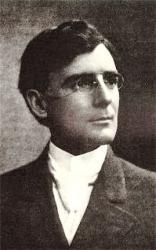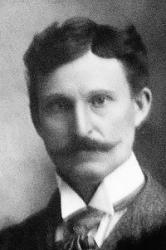1588 - 1632 Person Name: J. Stegmann. Author of "How lovely now the morning star" in Wartburg Hymnal Stegmann, Josua, D.D., son of Ambrosius Stegmann, Lutheran pastor at Sülzfeld, near Meiningen, and finally, in 1593, superintendent at Eckartsberga, near Merseburg, was born at Sülzfeld, Sept. 14,1588. He entered the University of Leipzig in 1608, M.A. in 1611, and was for sometime adjunct of the Philosophical Faculty. In 1617 he was appointed Superintendent of the district (Grafschaft) of Schaumburg, and also pastor at Stadthagen, and first professor of the Gymnasium there; and before entering on his duties graduated D.D. at Wittenberg, on Oct. 24, 1617. When the Gymnasium was erected into a university, and transferred (1621) to Rinteln, he became ordinary professor of Theology there. By the outbreak of war he was forced to flee from Rinteln, in 1623. After his return he was appointed, in 1625, Ephorus of the Lutheran clergy of Hesse-Schaumburg.
By the Edict of Restitution, promulgated by the emperor on March 6, 1629, he was greatly harassed; for the Benedictine monks, after they had settled in Rinteln, in 1630, claimed to be the rightful professors, and demanded the restoration of the old church lands, and especially the property formerly belonging to the nunnery at Rinteln, but which had been devoted to the payment of the stipends of the Lutheran professors. They sent soldiers into Stegmann's house to demand that he should refund his salary, and on July 13, 1632, compelled him to hold a disputation, at which they annoyed him in every possible way. Soon after he was seized with fever, and died Aug. 3, 1632. (Koch, iii., 128; Wetzel, iii., 251; Einladungsschrift des Gymnasium Bernhardinum, Meiningen, 1888; manuscript from Pastor A. Bicker, Rinteln; Dr. Förstemann, Leipzig), &c.
Stegmann was known as a writer of Latin verse while yet a student at Leipzig, and by his contemporaries was reckoned as a hymn writer. It is, however, very difficult to discriminate his productions. The hymns interspersed in his devotional works are given without any indications of authorship, and many of them are certainly by earlier writers, or recasts founded on earlier hymns….Two hymns, which are usually ascribed to Stegmann, and are not found earlier than in his works, have passed into English as follows:—
i. Ach bleib mit deiner Gnade. Supplication. In 1630 it is given in 6 stanzas of 4 lines, as a "Closing Hymn," after the "Prayer for the Preservation of the Doctrine, and of the Church of God." It is a simple and beautiful hymn, and is found in most recent German hymnals, e.g. as No. 208 in the Unverfälschter Liedersegen, 1851. Lauxmann, in Koch, viii., 146, relates various incidents regarding its use (it was, e.g., a favourite hymn of king Friedrich Wilhelm IV. of Prussia), and thus analyses it:—
"It has as its keynote the saying of the two disciples at Emmaus, 'Abide with us.' St. i. puts this prayer simply before the Lord Jesus; st. ii.—vi. develop it in detail: Abide with us with Thy Word as our Saviour (ii.); with the illumination of Thy Spirit as our ever-guiding Truth (iii.) ; with Thy blessing as the God rich in power (iv.); with Thy protection as the Conqueror in battle (v.); and with Thy Faithfulness as our Rock in the time of need (vi.).
The translations are:—
1. Abide with us, our Saviour. This is a free translation of st. i.-iii., as No. 51, in the Dalston Hospital Hymn Book, 1848; and repeated in the Pennsylvania Lutheran Church Book, 1868.
2. 0 Saviour, go beside us. This is a free translation of st. i., iv.,i v., with an original " Shepherd " st., as st. ii., by J. S. Stallybrass, in the Tonic Solfa Reporter, July 1857.
3. Abide among us with Thy grace. This is a good and full translation, in CM., by Miss Winkworth, in her Lyra Germanica, 2nd ser., 1858, p. 84; and her Chorale Book for England, 1863, No. 14.
4. Abide with us, Lord Jesus! Thy grace. This is a complete translation, as No. 8 in the Ohio Lutheran Hymnal, 1880, and marked as a compilation.
5. Come, abide with Thy grace, in our hearts, 0 Lord. By Dr. R. Maguire, 1872, p. 197.
ii. Wie schon leuchtet der Morgenstern, Vom Firmament des Himmels fern. Morning. Included in 1630, as above, p. 10, in 8 stanzas of 10 lines, entitled, "Morning Hymn." The translation in common use is —
How beautiful the Morning Star shines from the firmament afar. This was contributed by Philip Pusey to A. R. Reinagle's Psalm & Hymn Tunes, Oxford, 1840, p. 130. Other trs. are :—(1) "How fair shines forth the Morning-star." By H. J. Buckoll, 1842, p. 24. (2) "How lovely now the morning-star." By Miss Cox, 1864, p. 3. (3) “How beautiful the morning star, Shines in." By R. Massie, in the Day of Rest, 1876, p. 472. [Rev. James Mearns, M.A.]
--Excerpts from John Julian, Dictionary of Hymnology (1907)
Josua Stegmann

